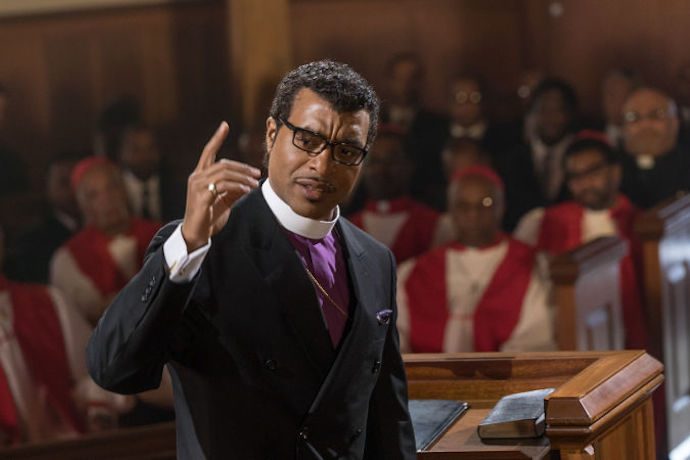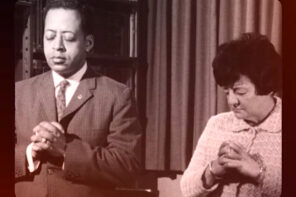What’s the message, Bishop?
That question, asked by the church’s closeted gay music director, Reggie (a convincing Lakeith Stanfield), provides the hinge for the whole Carlton Pearson story in the acclaimed new Netflix biopic, Come Sunday.
It’s a question that lingers still.
When Reggie puts the question to Pearson (Chiwetel Ejiofor, 12 Years a Slave) at a tense church staff meeting, the superstar Pentecostal preacher still hasn’t quite figured out what the gospel message is. He’s stirred up a mighty controversy and some defections within his 5,000-strong integrated Tulsa congregation (it’s the whites who leave first, naturally) by preaching that God can’t possibly want starving Rwandans to suffer eternity in Hell just because they haven’t accepted Jesus Christ as their personal savior. So far, so good on the universalism front. But Bishop Pearson is still telling an agonized Reggie to stop acting on his homosexuality; that just because Hell isn’t real doesn’t mean that sin isn’t real.
The film’s Reggie subplot is fictional, but the situation is not. It’s an open secret that there are many thousands of closeted and semi-closeted music directors serving in America’s churches who struggle all the time between their love for the church and its music and the word from the pulpit that they’re condemned if they act out their sexuality.
What’s apparently not fictional is the film’s intimation that Pearson’s “spiritual father,” televangelist Oral Roberts, had a gay son who committed suicide (the family still officially denies that Ronnie Roberts was gay). Urging Pearson to come to his senses and recant his universalism, the film’s Oral Roberts (a perfectly cast Martin Sheen) mourns how Ronnie is lost to him and lost to God, but Roberts still won’t budge from his belief that sinners make their own choices and that Hell is real. Never mind that his surviving son and chief lieutenant, Richard, is already known to be siphoning funds from Oral Roberts University.
I focus here on the fraught relationship between evangelical Christianity and gay people because that relationship continues to be a central unresolved drama facing Christianity in our time. It’s a drama that increasingly divides Christians in the Global South—the descendants of people who were “saved” through the work of 19th century European and North American missionaries—from the descendants of those very same missionaries who no longer find it possible to believe that God hates gays. It’s a drama that is literally tearing apart some of the world’s best-known international communions—Anglicans, Methodists, Lutherans, even Roman Catholics.
Come Sunday is at its most compelling when it shows Pearson reuniting with a Reggie who is now living with his mother in Texas and losing his personal battle with AIDS. Through this moving encounter with a dying man Pearson allows himself to be converted to a still more radical understanding of the gospel: one in which absolutely no one is excluded from God’s unconditional love (they hold each other, weeping and singing “Jesus Loves Me”). Completing this arc, the film ends with a scene in which Bishop Yvette Flunder welcomes Pearson as a kindred spirit to her ultra-diverse City of Refuge congregation in Oakland—an important reminder that there were fearless Pentecostalists willing to step up and step out long before Carlton Pearson took his stand in Tulsa.
According to his website, the real Carlton Pearson of today is migrating well beyond universalism to something he calls “Metacostalism”: a New Age-sounding brew of self-actualization and religious science. Personally, I wish that the impressively gifted Pearson could have stuck it out and fought the good fight within a Christianity that desperately needs to “go and learn what this means: ‘I desire mercy, not sacrifice’ ” (Mt. 9:13 – Jesus quoting Hosea).
One last word about the film. A second subplot—about the relationship between Pearson and his wife, Gina, played by a marvelous Condola Rashad—concerns another important and rarely explored dimension of any preacher’s life, which is how the unceasing demands of church work can too often leave a clergy spouse and/or clergy children starved for attention and affection.
And in praising the great performances in this film, I shouldn’t fail to mention Danny Glover, who makes an affecting early appearance as the preacher’s imprisoned Uncle Quincy. In the eyes of an as-yet-unconverted Pearson, this uncle who helped raise him is just another lost sinner headed for eternal perdition.
Neither writer Marcus Hinchey nor director Joshua Marston grew up in anything like the kind of hard-edged Christian faith that demands such harshness and cruelty, but their film makes it clear that they understand both that and how the struggle of someone like Carlton Pearson is really the struggle for the soul of Christianity itself.





